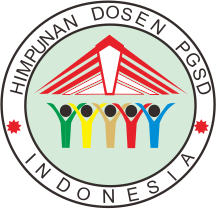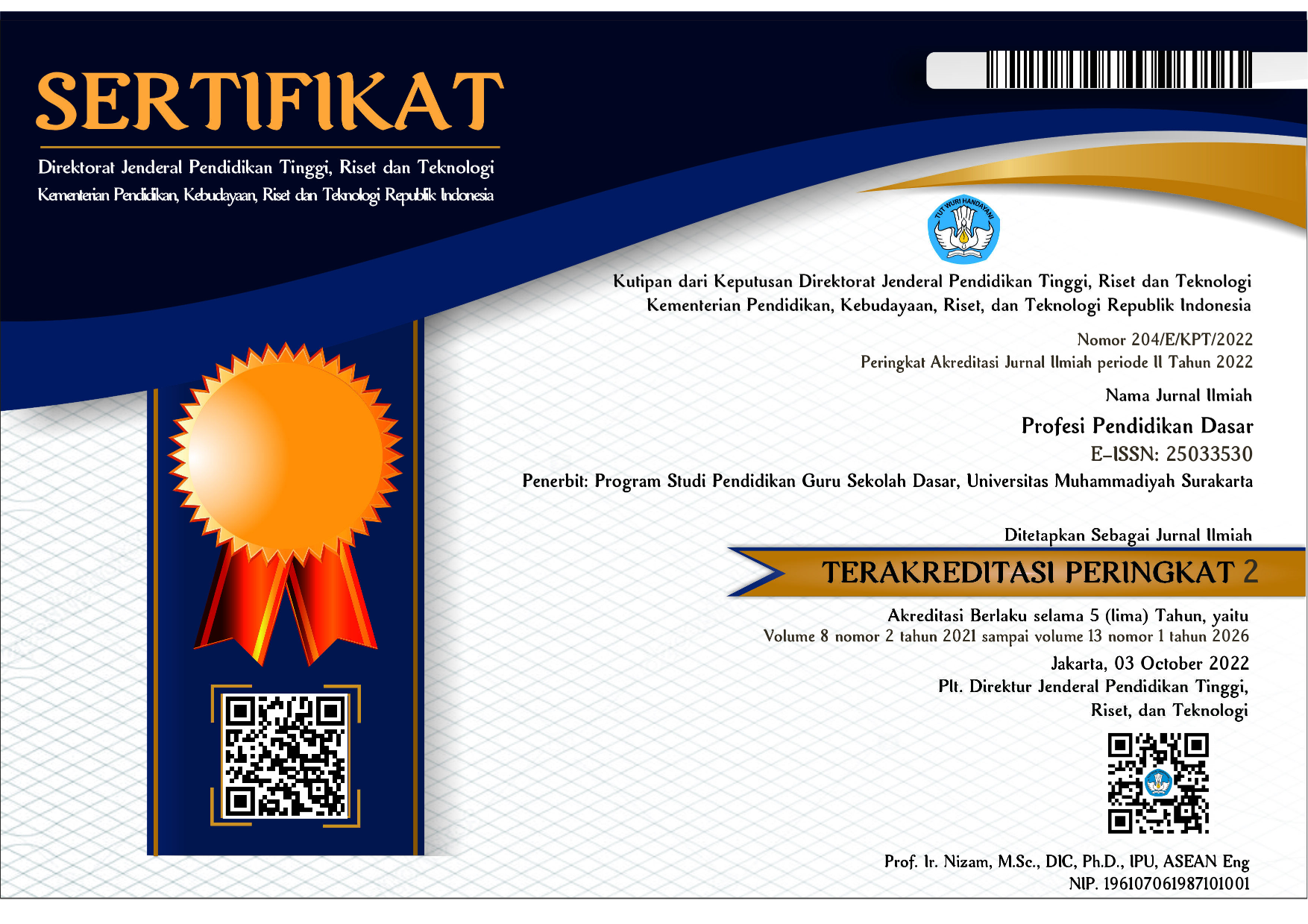Readiness of Elementary Teachers in Minimum Competency Assessment: Teachers' Competence in Arranging Literature and Numeration Tests
Titis Angga Rini(1*), Puri Selfi Cholifah(2), Ni Luh Sakinah Nuraini(3), Kay Margetts(4)(1) Universitas Negeri Malang, Malang
(2) Universitas Negeri Malang, Malang
(3) Universitas Negeri Malang, Malang
(4) The University of Melbourne
(*) Corresponding Author
Abstract
Keywords
Full Text:
PDFReferences
Anas, M., Muchson, M., Sugiono, S., & Forijati, R. (2021). Pengembangan kemampuan guru ekonomi di Kediri melalui kegiatan pelatihan asesmen kompetensi minimum (AKM). Rengganis Jurnal Pengabdian Masyarakat, 1(1), 48–57.
Andikayana, D., Dantes, N., & Kertih, I. (2021). Pengembangan Instrumen Asesmen Kompetensi Minimum (Akm) Literasi Membaca Level 2 Untuk Siswa Kelas 4 SD. Jurnal Penelitian Dan Evaluasi Pendidikan Indonesia, 11(2), 81–92.
Archana, S., & Usha Rani, K. (2017). Role of a teacher in English language teaching (ELT). International Journal of Educational Science and Research (IJESR), 7(1), 1–4.
Azizah, R. N. (2019). Mutu Pendidikan dan Budaya Literasi [Preprint]. INA-Rxiv. https://doi.org/10.31227/osf.io/eyfvp
Birenbaum, M., DeLuca, C., Earl, L., Heritage, M., Klenowski, V., Looney, A., Smith, K., Timperley, H., Volante, L., & Wyatt-Smith, C. (2015). International trends in the implementation of assessment for learning: Implications for policy and practice. Policy Futures in Education, 13(1), 117–140.
Chamisah, C. (2017). TIMSS and PISA-How They Help The Improvement of Education Assessment in Indonesia. ARICIS PROCEEDINGS, 1.
Dasmalinda, D., & Hasrul, H. (2020). Penerapan penilaian autentik berdasarkan kurikulum 2013 dalam pembelajaran Pendidikan Pancasila dan Kewarganegaraan. Jurnal Civics: Media Kajian Kewarganegaraan, 17(1), 94–103. https://doi.org/10.21831/jc.v17i1.29000
Daud, A., Novitri, N., & Hardian, M. (2020). Evaluation Of The Teacher Professional Education Program (Ppg): English Students’ Perspective. AL-ISHLAH: Jurnal Pendidikan, 12(2), 185–200. https://doi.org/10.35445/alishlah.v12i2.286
DeLuca, C., Valiquette, A., Coombs, A., LaPointe-McEwan, D., & Luhanga, U. (2018). Teachers’ approaches to classroom assessment: A large-scale survey. Assessment in Education: Principles, Policy & Practice, 25(4), 355–375.
Fauziah, A., Sobari, E. F. D., & Robandi, B. (2021). Analisis Pemahaman Guru Sekolah Menengah Pertama (SMP) Mengenai Asesmen Kompetensi Minimum (AKM). Edukatif: Jurnal Ilmu Pendidikan, 3(4), 1550–1558.
Grotlüschen, A., Desjardins, R., & Liu, H. (2020). Literacy and numeracy: Global and comparative perspectives. International Review of Education, 66(2–3), 127–137. https://doi.org/10.1007/s11159-020-09854-x
Handayani, T., Wuryadi, W., & Zamroni, Z. (2015). Pembudayaan Nilai Kebangsaan Siswa Pada Pendidikan Lingkungan Hidup Sekolah Dasar Adiwiyata Mandiri. Jurnal Pembangunan Pendidikan: Fondasi Dan Aplikasi, 3(1), 95–105. https://doi.org/10.21831/jppfa.v3i1.7815
Khair, U. (2018). Pembelajaran Bahasa Indonesia dan Sastra (BASASTRA) di SD dan MI. Ar-Riayah: Jurnal Pendidikan Dasar, 2(1), 81. https://doi.org/10.29240/jpd.v2i1.261
Kong, S. C. (2014). Developing information literacy and critical thinking skills through domain knowledge learning in digital classrooms: An experience of practicing flipped classroom strategy. Computers & Education, 78, 160–173. https://doi.org/10.1016/j.compedu.2014.05.009
Machromah, I. U., Utami, N. S., RiniSetyaningsih, D. M., & Fatmawati, L. W. S. (2021). Minimum Competency Assessment: Designing Tasks to Support Students’ Numeracy. Turkish Journal of Computer and Mathematics Education (TURCOMAT), 12(14), 3268-3277.
Maulidina, A. P., & Hartatik, S. (2019). Profil Kemampuan Numerasi Siswa Sekolah Dasar Berkemampuan Tinggi Dalam Memecahkan Masalah Matematika. Jurnal Bidang Pendidikan Dasar, 3(2), 61–66.
Megawati, L. A., & Sutarto, H. (2021). Analysis numeracy literacy skills in terms of standardized math problem on a minimum competency assessment. Unnes Journal of Mathematics Education, 10(2).
Muliastrini, N. (2020). New Literacy Sebagai Upaya Peningkatan Mutu Pendidikan Sekolah Dasar di Abad 21. PENDASI: Jurnal Pendidikan Dasar Indonesia, 4(1).
Mundia Sari, K., & Setiawan, H. (2020). Kompetensi Pedagogik Guru dalam Melaksanakan Penilaian Pembelajaran Anak Usia Dini. Jurnal Obsesi : Jurnal Pendidikan Anak Usia Dini, 4(2), 900. https://doi.org/10.31004/obsesi.v4i2.478
Muta’ali, J. A. (2020). Opini Masyarakat Tentang Asesmen Nasional Sebagai Penganti Ujian Nasional. Journal of Chemical Information and Modeling, 53(9), 1689–1699.
Nehru, N. A. (2019). Asesmen Komptenesi Sebagai Bentuk Perubahan Ujian Nasional Pendidikan Indonesia: Analisis Dampak dan Problem Solving Menurut Kebijakan Merdeka Belajar. Journal of Chemical Information and Modeling, 53(9), 1689–1699.
Nortvedt, G. A., Santos, L., & Pinto, J. (2016). Assessment for learning in Norway and Portugal: The case of primary school mathematics teaching. Assessment in Education: Principles, Policy & Practice, 23(3), 377–395.
Novita, N., Mellyzar, M., & Herizal, H. (2021). Asesmen Nasional (AN): Pengetahuan dan Persepsi Calon Guru. JISIP (Jurnal Ilmu Sosial Dan Pendidikan), 5(1). https://doi.org/10.36312/jisip.v5i1.1568
Nurhikmah, N., Hidayah, I., & Kadarwati, S. (2021). Persepsi dan Kesiapan Guru dalam Menghadapi Asesmen Kompetensi Minimum. Cokroaminoto Journal of Primary Education, 4(1), 78–83.
Osnal, O., Suhartoni, S., & Wahyudi, I. (2016). Meningkatkan kemampuan guru dalam menyusun tes hasil belajar akhir semester melalui workshop di kkg gugus 02 kecamatan sumbermalang tahun 2014/2015. Pancaran Pendidikan, 5(1), 67–82.
Rini, T. A., & Cahyanto, B. (2020). Supporting Elementary Students Creative Writing Skill With Assessment as Learning: Proceedings of the 2nd Early Childhood and Primary Childhood Education (ECPE 2020). 2nd Early Childhood and Primary Childhood Education (ECPE 2020), Malang, Indonesia. https://doi.org/10.2991/assehr.k.201112.010
Rohim, D. C. (2021). Konsep Asesmen Kompetensi Minimum untuk Meningkatkan Kemampuan Literasi Numerasi Siswa Sekolah Dasar. Jurnal Varidika, 33(1), 54–62.
Rust, C., Price, M., & O’DONOVAN, B. (2003). Improving students’ learning by developing their understanding of assessment criteria and processes. Assessment & Evaluation in Higher Education, 28(2), 147–164.
Sugiri, W. A., & Priatmoko, S. (2020). Persprektif Asesmen Autentik Sebagai Alat Evaluasi Dalam Merdeka Belajar. At-Thullab: Jurnal Pendidikan Guru Madrasah Ibtidaiyah, 4(1), 53. https://doi.org/10.30736/atl.v4i1.119
Sukmayadi, V., & Yahya, A. (2020). Indonesian Education Landscape and the 21st Century Challenges. Journal of Social Studies Education Research, 11(4), 219–234.
Sulistyaningrum, R., Sutama, S., & Desstya, A. (2021). Analyzing Skills of Planning, Conduct, and Assessment In Teachers During Online Mathematics Teaching. Profesi Pendidikan Dasar, 8(1), 63–74. https://doi.org/10.23917/ppd.v8i1.13108
Wulandari, E., & Azka, R. (2018). Menyambut Pisa 2018: Pengembangan Literasi Matematika Untuk Mendukung Kecakapan Abad 21. De Fermat: Jurnal Pendidikan Matematika, 1(1), 31–38. https://doi.org/10.36277/defermat.v1i1.14
Article Metrics
Abstract view(s): 1121 time(s)PDF: 647 time(s)
Refbacks
- There are currently no refbacks.


















